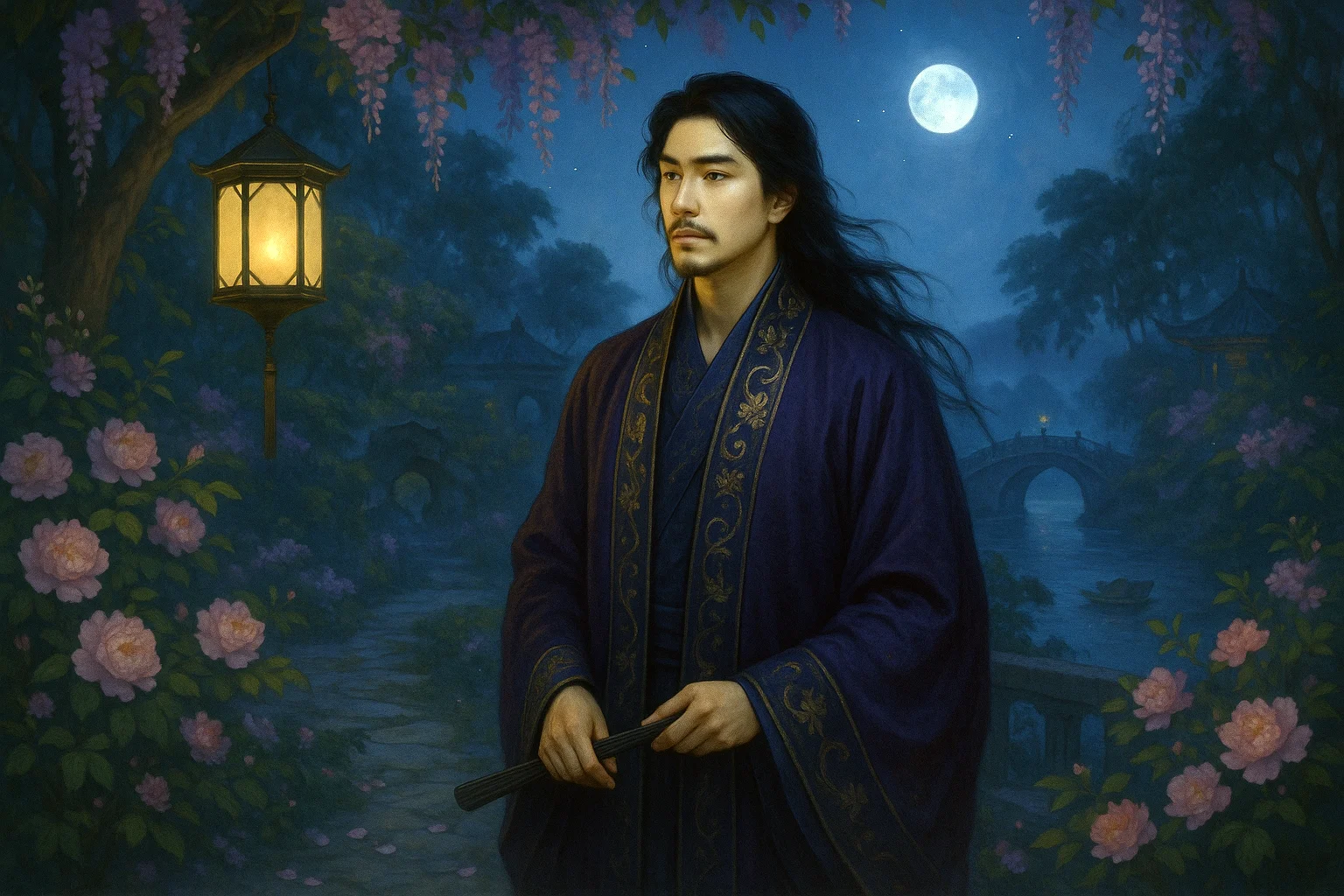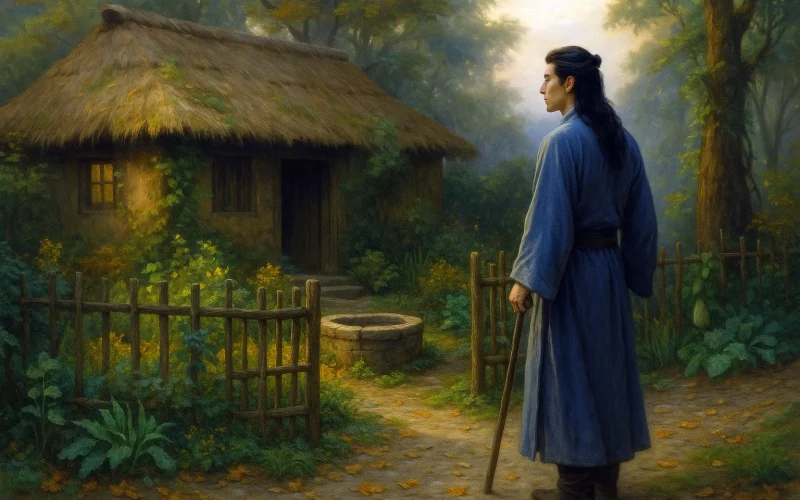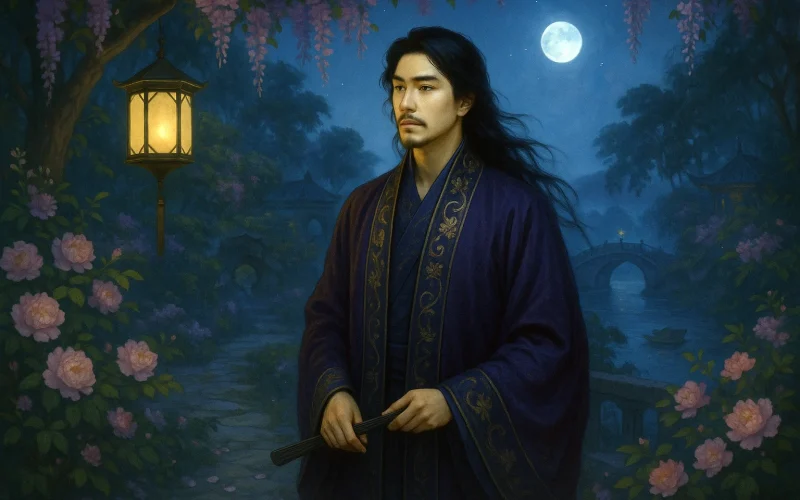Where the sun has entered the western hills,
I look for a monk in his little straw hut;
But only the fallen leaves are at home,
And I turn through chilling levels of cloud.
I hear a stone gong in the dusk,
I lean full-weight on my sl ender staff...
How within this world, within this grain of dust,
Can there be any room for the passions of men?
Original Poem
「北青萝」
李商隐
残阳西入崦,茅屋访孤僧。
落叶人何在,寒云路几层。
独敲初夜磬,闲倚一枝藤。
世界微尘里,吾宁爱与憎!
Interpretation
This poem was composed during the late Tang dynasty by poet Li Shangyin, who expresses his transcendence over worldly disturbances through depicting a process of visiting a monk and comprehending Zen. The title "North Green Vine" (北青萝 Běi Qīng Luó) may refer to the secluded mountain forest where the monk resides, or possibly to a place name. The entire poem uses the tranquil scenery of mountain solitude to reflect the poet's mental state, culminating in a sudden enlightenment about life during his visit to the monk, demonstrating a detached attitude toward worldly love and hatred.
First Couplet: "残阳西入崦,茅屋访孤僧。"
Cán yáng xī rù yān, máo wū fǎng gū sēng.
The setting sun sinks westward into mountain valleys; I visit a solitary monk in his thatched cottage.
The poet uses the imagery of the setting sun and mountain valleys to create an atmosphere of secluded antiquity, establishing the poem's fundamental tone.
Second Couplet: "落叶人何在,寒云路几层。"
Luò yè rén hé zài, hán yún lù jǐ céng.
Falling leaves scatter where no people remain; Cold clouds shroud the winding mountain path.
The late autumn scenery emphasizes the mountain's silent profundity, conveying a sense of chilly solitude while hinting at the poet's inner loneliness and contemplation.
Third Couplet: "独敲初夜磬,闲倚一枝藤。"
Dú qiāo chū yè qìng, xián yǐ yī zhī téng.
Alone he strikes the evening chime; Leisurely leaning on his vine-wrapped staff.
Through the combination of auditory and visual elements, this portrays the monk's serene and detached lifestyle, evoking Zen enlightenment.
Fourth Couplet: "世界微尘里,吾宁爱与憎!"
Shìjiè wēi chén lǐ, wú níng ài yǔ zēng!
In this world of floating dust, why should I cling to love or hatred?
The poet employs Buddhist wisdom to reveal the theme, expressing enlightened understanding that sees through worldly affairs and releases attachments.
Overall Appreciation
This poem conveys the poet's reflections on worldly matters through his account of visiting a monk. The first half establishes atmosphere with the silent scenery of autumn mountains, while the latter half uses the image of the transcendent monk to mirror the poet's changing state of mind. Originally troubled by worldly concerns, the poet gradually calms his thoughts in the quiet environment and Zen atmosphere, ultimately achieving deeper understanding about life.
Writing Characteristics
The poem creates a secluded artistic conception with profound emotions, using concise language rich in meaning. The parallel structure - "setting sun" versus "early night," "solitary monk" versus "alone strikes" - shows meticulous antithetical craftsmanship. Imagery like "falling leaves," "cold clouds," "alone strikes," and "leisurely leans" depicts the mountain depths' silent remoteness, saturated with Zen spirit. Particularly, the philosophically profound final couplet elevates the entire poem's realm.
Insights
This poem reminds us that human life is like floating dust, and worldly love and hatred are but transient illusions. Through visiting the monk, the poet obtains momentary peace and liberation, demonstrating a detached attitude toward worldly disturbances. This perspective represents not merely temporary self-comfort, but also a mental state worth emulating when facing life's joys and sorrows.
Poem translator
Kiang Kanghu
About the poet

Li Shangyin (李商隐), 813 - 858 AD, was a great poet of the late Tang Dynasty. His poems were on a par with those of Du Mu, and he was known as "Little Li Du". Li Shangyin was a native of Qinyang, Jiaozuo City, Henan Province. When he was a teenager, he lost his father at the age of nine, and was called "Zheshui East and West, half a century of wandering".












